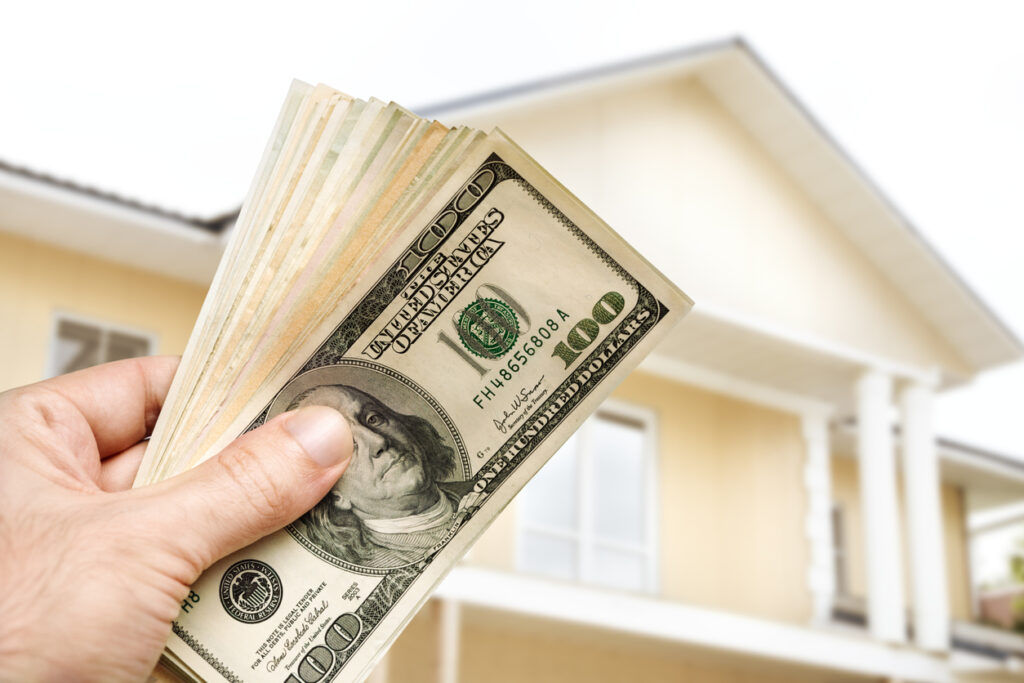Are Cash Offers for Houses Legit or Scams?
>>See Why Clients Love FastExpert Agents<<

They say cash is king and this sentiment has certainly rang true in the real estate industry over the past couple of years. According to the National Association of Realtors, cash sales made up 23% of home sales in 2021. By the end of 2022, that percentage had risen to 36%.
So, what’s causing the rise in cash offers for homes?
The answer could be linked to rising mortgage rates. With interest rates hovering at around 7%, buyers are struggling to obtain an affordable mortgage. Those who have the funds readily available often prefer to pay cash for homes and avoid the mortgage application altogether.
Given the scarcity of cash buyers in the market and lack of familiarity with closing with a cash offer, it’s understandable that sellers would be skeptical of accepting one. However, cash buyers are not the only ones benefitting from cash offers. Sellers stand to gain a lot from a cash offer, as well.
All-cash offers are attractive to sellers because the selling process is often quicker and less stressful when a mortgage isn’t involved. In an all-cash deal, buyers save money on the purchase price and sellers save time by not having to wait for a third party to approve financing requests.
In this article, we will discuss what a cash offer is, who you may receive a cash offer from, the benefits of accepting one, and how to tell if a cash offer is a scam.
What is a cash offer?
In real estate, a cash offer is when the buyer is willing to cover the cost of a home purchase with cash instead of a mortgage loan. Cash home buyers will typically deposit the funds via check or wire transfer in a matter of weeks.
Cash sales differ from traditional sales because they don’t require a home loan, which means both the buyer and seller can bypass the need for an escrow company, lender fees, and other fees associated with buying a house.
This often makes for a hassle-free sale. It’s essential to keep in mind, however, that although they tend to be less in a cash sale, closing costs still need to be covered.
What kind of cash do buyers put in offers?
Homeowners often receive unsolicited offers via e-mail, text messages, and cold calls from various cash buyers with the financial means to purchase a property in cash.
Some are traditional buyers with exceptional financial means, while others are investors looking for lucrative returns. Take a look at some of the legitimate cash buyers you may run into as a homeowner with a desirable property:
Investors
Real estate investors are people who purchase property with the intent of turning a profit through a fix-and-flip or buy-and-hold strategy. Investors who fix and flip often purchase run-down homes on the brink of foreclosure, renovate them, and then sell them to a new buyer at higher sales prices.
Investors who buy and hold property typically buy homes that require minimal maintenance and are capable of being rented out on a monthly basis.
House flippers usually offer a lower sales price than investors who buy and hold. This is because they want to increase their profit margin in the short term.
However, if you’re not in a rush to sell your home or if it’s in excellent condition, don’t feel pressured to accept a low cash offer. You may be able to find a buyer willing to pay full market value for your property, or even more, depending on the state of the local market.
Sellers often come across real estate investment groups who invest in real estate, collectively. These home-buying companies sometimes specialize in buying specific types of homes or in specific areas.
Make sure to research the investors you are receiving cash offers from before entering into any type of purchase agreement.
Wholesalers
Another type of cash offer you may come across is a wholesaler’s cash offer.
Wholesalers are sometimes referred to as investors because they facilitate the purchase of a home for sellers and buyers. However, they don’t invest in real estate directly.
A wholesaler finds properties for real estate investors who don’t have time to go out and source deals on their own. They then charge a finder’s fee of 5%-10% which is carved out of the deals they secure for their investors.
Some agents advise against working with wholesalers because, in this type of deal, the seller often receives much less than what they could have received if they were to sell their home either on the open market or directly to an investor.
Real Estate Agents (on behalf of their buyers)
Not all cash offers come from investors or wholesalers looking to turn a profit.
Traditional homebuyers will often put in a cash offer on a home in a highly competitive market where buyer demand far outweighs housing supply. The motivated buyer may ask a real estate agent to put in a cash offer on their behalf on a home they’d like to purchase off-market.
Although rare, there are some buyers with the financial means to put in an all-cash offer on a dream home they don’t want to risk losing.

What are the benefits of a cash sale?
Cash offers provide sellers with several benefits. Here are three key reasons why a seller may prefer a cash offer over a traditional home sale:
The transaction is quick.
Accepting a cash offer means you can sell your home in weeks instead of months.
This is because you won’t need to market your property across multiple platforms, host regular showings, or wait for a lender to approve a buyer’s mortgage loan.
Buying a home in all cash can considerably reduce the time it takes to close, especially if you receive a no-obligation cash offer which is when a cash buyer offers to purchase a property free of any contingencies or requirements.
You’ll save on staging costs, home repairs, and agent commissions.
Cash buyers are usually highly motivated buyers who have already decided they want your property.
As a result, you don’t need to go out of your way to make the home look appealing through staging or renovations. Whether the cash buyer is purchasing the home for personal or investment reasons, they’re usually willing to buy the home as is.
Additionally, since the buyer has already located the property they want to purchase, there isn’t a need to involve a buyer’s agent in the transaction.
The buyer is often willing to pay closing costs and fees.
Lastly, because the buyer is cash-heavy (or at least they should be), they’re often willing to cover closing costs, outstanding property taxes, and other fees associated with the sale of the property.
You can work this into the purchase contract before signing closing documents. At the very least, closing costs will be less on a cash deal than on a traditional sale.
How do you know if a cash offer is legit?
The beauty and the danger of cash offers is that anyone can put one in.
Some offers come from legitimate investors capable of paying cash for homes, while others come from scammers who have no intention of purchasing your property at a reasonable price.
Here’s how to spot the difference between the two:
Ask the buyer to provide proof of ability to purchase.
The first thing you want to do as a seller is confirm that the cash buyer actually has the funds available to purchase your home.
Without cash on hand, there’s no cash deal.
Ask the buyer to provide a copy of their recent bank account statements. You could also ask for the buyer to give you a copy of legal documentation confirming their ability to liquidate assets totaling or surpassing your home’s sales price.
Check references thoroughly and across multiple platforms.
Investors who have put in cash offers before will have existing relationships with title companies and other real estate professionals. Although checking online is a good place to start, go a step further by asking your cash buyer what real estate companies they work with.
If they can’t come up with any names, consider this a red flag.
Reputable cash buyers purchase homes on a regular basis. They can’t do this all on their own, so they have to work with at least a couple of other real estate professionals.
If they are able to provide you with some names, contact these companies and ask about the cash buyer’s reputation.
Test their responsiveness.
Another way to test whether or not a cash buyer is serious is by verifying their communication skills.
Cash buyers may not be in the business of buying homes full-time, but if they are legitimate buyers looking to close a deal, they’ll return your call within a couple of days.
No buyer is too busy for a deal they’re serious about.

How do you know if a cash offer is a scam?
Poor communication, a weak reputation, and an inability to prove funds are all signs that a buyer may not be serious.
However, there are ways to tell a cash offer is a scam from the beginning. Here are some common tactics used by scammers:
Email or Text Message Phishing
Be wary of messages asking for personal information right off the bat. Cold emails are frequently used in real estate to communicate with potential clients and customers.
However, no legitimate business person will ask you to wire money or provide bank information without having at least visited the property first or sent someone on their behalf.
Avoid opening or responding to these kinds of messages.
Up-front Fees
Another thing sellers should be cautious of is up-front fees. If a cash buyer requests for you to put down a deposit before they buy your home, they may intend to take your money and then cancel the deal.
As mentioned above, cash buyers aim to make the transaction as smooth as possible for the seller and are often willing to handle many of the fees associated with home sales.
You should never have to pay for anything upfront. Your expenses come after the deal is closed.
Equity Skimming
Equity skimming is a more sophisticated scheme where the investor buys a distressed property and then promises the seller they’ll let them repurchase it when they’re in a better financial position and can afford their monthly mortgage payment.
Instead, the investor refinances the home while it is in their possession and takes out all of the home’s equity. Even if the home is sold back to the seller, it’s sold with less equity than before.
Find an agent to help you evaluate cash offers on your home
Cash offers from investors benefit sellers because they facilitate the closing process. It is important to note, however, that cash offers usually pay less than market offers.
The among of money you’ll receive for your home will depend on a variety of factors, including comparable sales, repairs that need to be completed, the neighborhood of the property, and the size of the mortgage. But in the end, the offer will be less than the fair market value of your home.
Cash buyers pay an average of 12% less than financed buyers since financed buyers are more likely to have to compensate for the risks associated with a mortgage with a higher offer. However, cash offer is a legal and viable way of selling your home.
If you’re not sure whether or not a cash offer makes sense for you or if you’re worried a cash offer you received may be a scam, reach out to one of the top real estate agents in your area to discuss your options.





